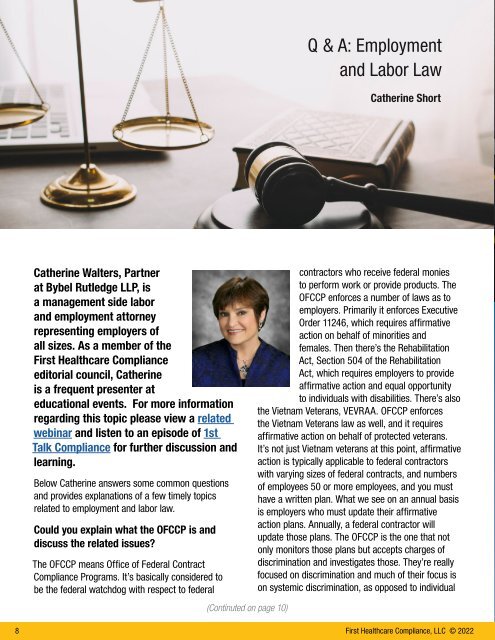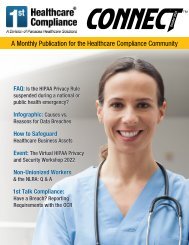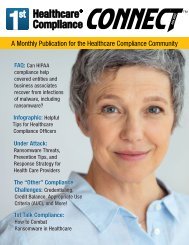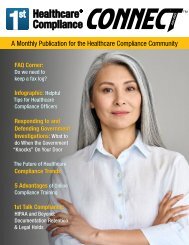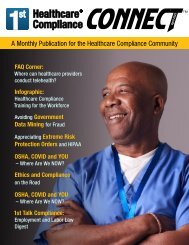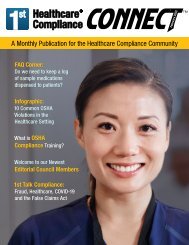First Healthcare Compliance CONNECT August 2022
You also want an ePaper? Increase the reach of your titles
YUMPU automatically turns print PDFs into web optimized ePapers that Google loves.
Q & A: Employment<br />
and Labor Law<br />
Catherine Short<br />
Catherine Walters, Partner<br />
at Bybel Rutledge LLP, is<br />
a management side labor<br />
and employment attorney<br />
representing employers of<br />
all sizes. As a member of the<br />
<strong>First</strong> <strong>Healthcare</strong> <strong>Compliance</strong><br />
editorial council, Catherine<br />
is a frequent presenter at<br />
educational events. For more information<br />
regarding this topic please view a related<br />
webinar and listen to an episode of 1st<br />
Talk <strong>Compliance</strong> for further discussion and<br />
learning.<br />
Below Catherine answers some common questions<br />
and provides explanations of a few timely topics<br />
related to employment and labor law.<br />
Could you explain what the OFCCP is and<br />
discuss the related issues?<br />
The OFCCP means Office of Federal Contract<br />
<strong>Compliance</strong> Programs. It’s basically considered to<br />
be the federal watchdog with respect to federal<br />
(Continuted on page 10)<br />
contractors who receive federal monies<br />
to perform work or provide products. The<br />
OFCCP enforces a number of laws as to<br />
employers. Primarily it enforces Executive<br />
Order 11246, which requires affirmative<br />
action on behalf of minorities and<br />
females. Then there’s the Rehabilitation<br />
Act, Section 504 of the Rehabilitation<br />
Act, which requires employers to provide<br />
affirmative action and equal opportunity<br />
to individuals with disabilities. There’s also<br />
the Vietnam Veterans, VEVRAA. OFCCP enforces<br />
the Vietnam Veterans law as well, and it requires<br />
affirmative action on behalf of protected veterans.<br />
It’s not just Vietnam veterans at this point, affirmative<br />
action is typically applicable to federal contractors<br />
with varying sizes of federal contracts, and numbers<br />
of employees 50 or more employees, and you must<br />
have a written plan. What we see on an annual basis<br />
is employers who must update their affirmative<br />
action plans. Annually, a federal contractor will<br />
update those plans. The OFCCP is the one that not<br />
only monitors those plans but accepts charges of<br />
discrimination and investigates those. They’re really<br />
focused on discrimination and much of their focus is<br />
on systemic discrimination, as opposed to individual<br />
8<br />
<strong>First</strong> <strong>Healthcare</strong> <strong>Compliance</strong>, LLC © <strong>2022</strong>


